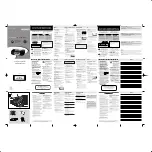
4.4 Technical Details on GPS, Antennas and Cables
21
4.4
Technical Details on GPS, Antennas and Cables
4.4.1
Antenna Cable
Length and Loss Considerations
Standard Antenna Cable
The standard antenna cable assembly included with the clock is constructed using a 15-meter
(50-foot) length of RG-6 type low-loss coaxial cable, terminated with male Type F connectors.
Optional lengths of RG-6 coax are separately available for longer runs; see Table 4.2, Cable Data
and Accessory Information.
Effects of Cable Parameters
To receive GPS signals and properly operate the clock, the type and length of the cable are impor-
tant. Due to their effect on specific parameters described in the following paragraphs, any changes
to the length and/or type of antenna cable should be made carefully. Damaged cables may also
affect performance.
Cable Delay
The velocity factor and the physical length of the cable determine cable delay. During the initial
factory calibration of the clock, a value for cable delay (based upon the length and type of cable
supplied) is entered into the clock memory. Firmware uses this figure to counteract the effect that
the delay has upon GPS timing accuracy. The value entered for a standard 15-meter cable is 60
nanoseconds. For other cable options, the delay is tabulated below. The formula for calculating
cable delay is:
(4.1)
T
=
λ
1
CKv
+ 1
ns
Where:
T = Cable delay, in nanoseconds;
λ
= Cable length, in meters;
C = Speed of light (3
×
10
8
meters per second);
Kv = Nominal velocity of propagation (0.85).
One nanosecond is added to the calculated value to account for the length and velocity factor
of the short connecting cable inside of the clock.
Attenuation
Attenuation depends upon the cable length, and the loss per unit length. The total attenuation
must be limited to 21 dB (maximum) at the GPS L1 frequency of 1575.42 MHz. Loss up to 42 dB
can be accommodated with the separately available 21-dB in-line preamplifier (P/N AS0044700).
Summary of Contents for 1084A
Page 4: ...iv ...
Page 6: ...vi ...
Page 18: ...xviii LIST OF FIGURES ...
Page 24: ...4 Unpacking the Clock ...
Page 36: ...16 Connecting Inlet Power Input and Output Signals ...
Page 44: ...24 GPS Antenna and Cable Information ...
Page 114: ...94 Startup and Basic Operation ...
Page 123: ...B 4 Physical Dimensions 103 Figure B 1 Suggested Mounting of the AS0094500 Surge Arrester ...
Page 124: ...104 Using Surge Arresters ...
Page 134: ...114 Options List C 6 2 Option 06 Firmware Setup Figure C 3 Option 06 Firmware Setup ...
Page 142: ...122 Options List Figure C 5 Option 06 Output Jumper Settings ...
Page 158: ...138 Options List Figure C 13 Option 17 Board Layout and Jumper Locations ...
Page 163: ...C 13 Option 20A Four Fiber Optic Outputs 143 Figure C 14 Option 20A Jumper Locations ...
Page 170: ...150 Options List Figure C 16 Option 23 Internal Jumper Setup ...
Page 172: ...152 Options List Figure C 17 Option 27 Jumper Locations ...
Page 190: ...170 Options List Figure C 20 Option 29 Connector Signal Locations ...
Page 246: ...226 Options List ...
















































